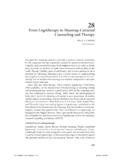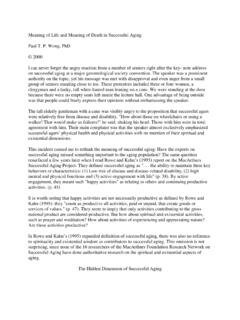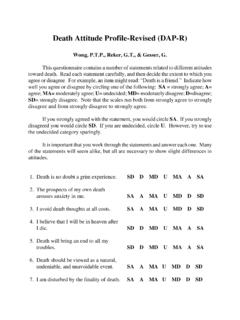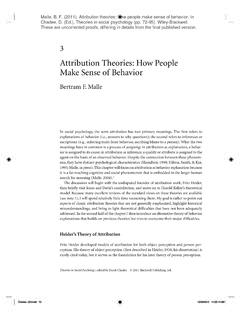Transcription of When People Ask Why Questions, and the Heuristics of ...
1 Journal of Personality and Social Psychology Copyright 1981 by the Amii crican Psychological Association, Inc. 1981, , No. 4, 650-663 0022-3514/81 when People Ask & quot ;Why& quot ; Questions, and the Heuristics of Attributional Search Paul T. P. Wong Bernard Weiner Trent University, Peterborough, University of California, Los Angeles Ontario, Canada Five experiments making use of a self-probe methodology in both simulated and real conditions demonstrated that individuals do engage in spontaneous attri- butional search. This search is most likely when the outcome of an event is negative and unexpected. Content analysis of attributional questions also sug- gested that causal search is biased toward internality after failure but toward externality following success. This reverse of the oft-reported hedonic bias im- plicates the adaptive function of causal search. The data also revealed that the most commonly used heuristic in attributional search is to center on the locus and control dimensions of causality.
2 The importance of Heuristics in causal search and the advantages of the self-probe methodology employed in these investiga- tions are discussed. Central to attribution theory is the as- in the attribution area have contended that sumption that People spontaneously engage individuals carry with them sets of beliefs, in attributional activities. But there is little schemas, or presuppositions as to how var- or no published evidence to substantiate this ious causes and effects are related (see Kel- claim (Bern, 1972; Wortman & Dintzer, ley & Michela, 1980). If our experiences 1978). In the literature of attribution re- conform to our beliefs and expectations, then search, subjects typically are asked to make there is no need to search for explanations. attributions either by completing a fixed For example, the conviction that & quot ;aptitude& quot ;. number of rating scales or by providing is a relatively stable characteristic is gen- open-ended explanations for events.
3 Both erally accepted in our culture; students with methods are highly reactive. In the absence proven aptitudes in, for example, math or of adequate methodology, the issue of artistic endeavors are expected to do well in whether lay People engage in spontaneous those areas. Given this belief and expecta- attributional activities remains unsolved. In tion, success in these activities should not this article, we re-examine this issue, identify call for explanation or elicit attributional the major preconditions for attributional search. search, propose a new self-probe methodol- A corollary of the above reasoning is that ogy, and then present data yielded by this attributional search will take place when methodology. one's experiences cannot be readily assimi- A presumption guiding this article is that lated into one's existing belief system. A fre- it is more fruitful to ask when , rather than quently encountered difficulty in the assim- if, attribution occurs.
4 No one has proposed ilation of information results from discon- that the attribution process goes on at all firmation of existing beliefs and related times. To the contrary, many investigators expectancies. Examples of this type of This research was supported by a Leave Fellowship disconfirmation abound in real life: cheating from the Social Sciences and Humanities Research by a person with a reputation for honesty Council of Canada to Paul T. P. Wong and a grant from and integrity; failure by a student known to the Spencer Foundation to Bernard Weiner. be competent; or rejection of a manuscript The authors are grateful to Alan Worthington for submitted by an established author. In each statistical consultation. Reprint requests should be sent to Paul T. P. Wong, of these cases, the disconfirmed expectations Department of Psychology, Trent University, Peterbor- are based on the belief that perceived dis- ough, Ontario K9J 7B8 Canada.
5 Positions such as honesty, competence, and 650. Heuristics OF ATTRIBUTIONAL SEARCH 651. creativity are relatively stable. Disconfir- tions. when one is still engaged in problem mation of expectations based on consensus solving, it is only natural to be preoccupied information, such as task difficulty, also is with possible ways and means of solving the likely to trigger the attribution process. For problem rather than explaining the antici- example, failure at an & quot ;easy& quot ; task is incon- pated outcome. The absence of attributional sistent with the expectations generated by cognitions in their mastery-oriented subjects the concept of & quot ;easy.& quot ; might be so explained. The hypothesis that expectancy disconfir- The present self-probe methodology is a mation instigates attribution processes has modification of Diener and Dweck's proce- been alluded to by a number of investigators dure. Instead of asking subjects to verbalize (see Lau & Russell, 1980; Pyszczynski & what they are thinking while performing, we Greenberg, 1981).
6 For example, it has been asked subjects to report what questions, if suggested that atypical events are more any, they would ask themselves following a likely to elicit multiple causality than typical particular outcome. Since causal explana- events (Kelley, 1971). Furthermore, it has tions are answers to & quot ;why& quot ; questions, self- been demonstrated that novel or unexpected questioning seems to be a direct and natural events promote exploration (Berlyne, 1960); way to gauge the extent of attributional attributional search can be considered one search, and it at least has the face validity instance of the more general class of ex- of measuring the presence and depth of one's ploratory behaviors. search for causal understanding. To broaden In addition to expectancy disconfirmation, the sample of cognitions reported by the sub- frustration (failure) is hypothesized to be a jects, in our final experiment we instructed second potent instigator of the attribution them to report whatever questions or process.
7 The law of effect dictates that or- thoughts came into their minds following an ganisms are motivated to terminate or pre- event. vent a negative state of affairs. But effective coping importantly depends on locating the Experiment 1. cause(s) of failure. In this case, attribution serves an adaptive function. In support of The main purpose of this experiment was this line of reasoning, there is evidence that to document that individuals do sponta- rejection in an affiliative context is more neously ask & quot ;why& quot ; questions and that the likely to elicit attributional search and in- extent of causal search is determined by the formation seeking than is acceptance (Folkes, nature of the outcome (success vs. failure). in press). Furthermore, it has been docu- and expectancy (expected vs. unexpected mented that failure in instrumental learning outcome). We predicted that both frustra- and at achievement-related tasks promotes tion (failure) and expectancy disconfirma- exploration (Wong, 1979).
8 Finally, there is tion (unexpected outcome) would instigate evidence to suggest that People are moti- more attributional search than success and vated to preserve their self-esteem; attribu- an expected outcome. tion may also serve a defensive function Given the above contexts, most of the when self-esteem is threatened (Zuckerman, questions that People spontaneously ask were 1979). In sum, it is hypothesized that expected to be related to attributional search. expectancy disconfirmation (unexpected However, individuals also may raise action- events) and frustration (nonattainment of a oriented questions ( , & quot ;What can I do goal) will give rise to attributional search. about the situaton?& quot ;). Studies of coping with Unfortunately, the reactive methodologies stress ( , Folkman, Schaefer, & Lazarus, currently in use do not permit an unambig- 1979; Lazarus, 1966) have documented the uous test of these hypotheses.
9 Diener and existence of & quot ;secondary appraisal,& quot ; a process Dweck (1978) overcame the reactive issue of evaluating one's coping resources and op- and have reported a measure of spontaneous tions. It was predicted that failure would also attributions. In one of their investigations, elicit more of such action-oriented questions children were instructed to verbalize & quot ;what than would success. they were thinking about& quot ; while performing. Finally, it was anticipated that unex- But this procedure has a number of limita- pected outcomes would evoke more reeval- 652 PAUL T. P. WONG AND BERNARD WEINER. uative questions than expected outcomes. into these three categories. (The distinctions Since in the present study expectancy was and examples for each category were given primarily based on the belief that one was to the judges prior to coding.). a strong or weak student, expectancy dis- Figure 1 shows the total number of ques- confirmation should have resulted in a state tions asked (top panel) as well as the number of imbalance (Feather, 1971; Heider, 1958) of questions asked in the attribution (middle or dissonance (Festinger, 1957) in regard to panel) and action and re-evaluation (bottom oneself.)
10 To maintain self-consistency, one panels) categories. Only 5% of the ques- may either & quot ;explain away& quot ; the unexpected tions fell in the miscellaneous category; they outcome or modify one's beliefs to accom- are not included in the figure. Concerning modate the outcome. The latter strategy causal ascriptions, failure and unexpected may give rise to questions related to the reas- outcomes generated more attributional ques- sessment of one's competence ( , & quot ;Am I tions than did success and expected out- smarter than I think?& quot ;). comes, respectively, F(l, 69) = , p <..001; F(l, 69) = , p < .001. There also was a significant Outcome X Expectancy in- Method teraction, F(l, 69) = , , pri- Seventy students (41 females and 29 males) partici- marily due to the very low rate of responding pated in the sudy as part of their course requirement in the expected success condition. for introductory psychology at the University of Cali- As hypothesized, failure generated more fornia, Los Angeles (UCLA).












